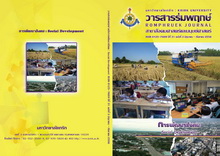นโยบายการพัฒนาระบบทหารอาสาสมัครของกองทัพไทยโดยการสร้างแรงจูงใจเข้าสู่การเป็นทหารกองประจำการ
Main Article Content
Abstract
ผลการวิจัยพบว่า 1) นโยบายการพัฒนาระบบทหารอาสาสมัครของกองทัพไทย โดยการสร้างแรงจูงใจเข้าสู่การเป็นทหารกองประจำการ มีความเป็นไปได้สูง รัฐบาล ต้องสนับสนุนงบประมาณให้กับกองทัพให้เพียงพอต่อการพัฒนาทหารกองประจำการ เพื่อนำไปใช้สร้างแรงจูงใจในการสมัครเข้าเป็นทหารกองประจำการ 2) กองทัพจะ ต้องเป็นผู้กำหนดระเบียบการใหม่ นำเสนอให้กระทรวงกลาโหมเป็นผู้ดำเนินการใน การกำหนดนโยบายนี้ ซึ่งโอกาสที่นโยบายจะประสบผลสำเร็จมีความเป็นไปได้อย่างมาก เพราะมีจุดแข็งคือ กองทัพได้คนที่เต็มใจเข้ามารับราชการ มีความรู้ มีประสิทธิภาพ เข้มแข็ง มีคุณภาพ มีระเบียบวินัยสูง ทุ่มเทเสียสละให้กับกองทัพ มีอุดมการณ์ความรักชาติ ทำให้กองทัพมีคุณภาพเป็นหลักประกันในการปฏิบัติหน้าที่ตามที่กำหนดไว้ในรัฐธรรมนูญ ได้ครบถ้วน และสมบูรณ์ ส่วนจุดอ่อนของนโยบายทหารอาสาสมัครคือ กองทัพยังไม่มี นโยบายที่ชัดเจนในการสนับสนุนงบประมาณ เพื่อดำเนินการในระบบทหารอาสาสมัคร และต้องแก้พระราชบัญญัติรับราชการทหารที่เกี่ยวข้องอีกหลายข้อ 3) ผลกระทบ ของนโยบายทหารอาสาสมัครคือ ต้องศึกษาในระยะยาว แต่น่าจะเป็นไปในทิศทาง ที่ดีหากมีการนำไปสู่การปฏิบัติ เพราะสามารถทำให้กองทัพเข้มแข็งมากขึ้น แต่จะ เกิดความไม่เป็นธรรมในสังคมกับกลุ่มคนที่ไม่ได้เป็นทหารอาสาสมัคร
การสังเคราะห์ผลการวิจัยในการนำนโยบายไปปฏิบัติ ที่จะประสบผลสำเร็จจาก การวิจัย คือ กองทัพจะต้องจัดให้มีการประชาสัมพันธ์สร้างแรงจูงใจเกี่ยวกับเงินเดือน เบี้ยเลี้ยง การได้รับสวัสดิการ และสิทธิต่างๆ การดำเนินการรับทหารอาสาสมัครให้ รับสมัครตั้งแต่อายุ 18 ปีบริบูรณ์ขึ้นไปตามมาตรฐานของนานาชาติ ในระหว่างรับราชการ ต้องเพิ่มประสิทธิภาพให้กับทหารอาสาสมัครทั้งทางร่างกาย และจิตใจ สร้างทัศนคติ ที่ดีต่อกองทัพสร้างขวัญกำลงั ใจ ปลูกฝังอุดมการณ์ความรักชาติ ให้โอกาสทางการศึกษา ต่อในระหว่างรับราชการ สนับสนุนด้านการฝึกวิชาชีพก่อนปลดประจำการ และหลังปลด ประจำการต้องประกอบด้วยปัจจัยสำคัญ 5 ประการคือ 1) การสอบบรรจุเข้าโรงเรียน นายสิบทหารทั้ง 3 กองทัพ ให้รับเฉพาะทหารอาสาสมัครเท่านั้น 2) กองทัพจัดหางาน รองรับหลังจากที่รับราชการครบ 2 ปี เพื่อเป็นหลักประกันความมั่นคงก้าวหน้าในอาชีพ 3) สามารถรับราชการเป็นทหารกองประจำการต่อได้ถึงอายุ 25 ปี หากมีใจรักในอาชีพ ทหารต้องการที่จะรับใช้ชาติต่อ 4) ได้รับการบรรจุเข้ารับราชการเป็นนายทหารชั้นประทวน หรือนายทหารสัญญาบัตรตามคุณวุฒิที่กำหนดไว้ และ 5) ทหารอาสาสมัคร ที่ไม่มีงานรองรับเมื่อปลดประจำการควรมีบำเหน็จให้คนละ 30,000 บาท หรือพิจารณา ให้ตามความเหมาะสม เพื่อนำไปลงทุนประกอบอาชีพที่ตนถนัด และที่สำคัญที่สุด ทุกฝ่ายต้องมีความมุ่งมั่น และจิตสำนึกในการปฏิบัติตามนโยบายการพัฒนาระบบ ทหารอาสาสมัครให้กับกองทัพต่อไป
The Policy for Development of Thai Volunteer Armed Forces by Motivating to be Military Personnels
The objectives of this research were: 1) to study the development policy of military volunteer system in Royal Thai Armed Forces to replace the drafted personnel, 2) to analyze the policy, model, opportunity, strength and weakness of volunteer force policy and 3) to study the effects and to propose the development system of volunteer force policy. The research used a mixed method of the qualitative and quantitative approaches. The qualitative method was conducted by using in-depth interview on 22 high ranking officers in the Armed Forces as key informants and were specifically selected and a focus group of 20 officers in the drafting committee of the Armed Forces. The data were analyzed by using the content analysis to interpret, define and analyze the data. In the quantitative method, the questionnaires, at the level of confidence of 0.9163, were used as the research tool to collect the data from the samples of 400 volunteer Army personnel, computed by Taro Yamane’s formula and selected by a multi-stage random sampling technique and samples of the Navy and Air Force of 100 personnel by an accidental random sampling technique. The data were analyzed by using descriptive statistics consisted of percentage, mean, and standard deviation.
The research findings were: 1) the Development Policy of military volunteer system in Thai Armed Forces could be made possible at the high level. The government must allocate the sufficient budget for the Armed Forces to create the motivation for military volunteer project master plan, 2) The Royal Thai Armed Forces should promulgate the new regulations for the military volunteers to replace the former drafting system by informing the Ministry of Defense to set up this new policy. The strength point is the creation of the high possibility of success for the reason of having the willing, well educated, high efficient, strong, qualified, high disciplined, devoted persons and high national ideology. The Armed Forces will be qualified to perform their missions complied with the constitution perfectly. The weakness of this policy was that there were no clear policy, and sufficient budgets for processing volunteer force. There were also many military bills and regulations to be amended. 3) The effects on the policy of volunteer force should be studied in the long run and implied a good direction whenever to be practiced as it world enable a stronger Thai Armed Forces but it may be unfair for non military volunteer.
Therefore, there should be more studies and researches on the policy implementation to support The Army to set the new salary allowances for food welfare and other expenses. To comply with the international standards, the applicants for volunteer force must be eligible at eighteen years old and have good and perfect body and mind with good attitude to the Armed Forces to be recruited and later have to attend the Armed Force Non-Commissioned Officer Schools. They should receive vocational training before discharge and after discharge should be concluded by 5 factors. 1) The entrance examination to various three military schools should be qualified by the volunteer force only. 2) The opportunities should be provided to the dismissed volunteer force the new jobs after 2 years in services. 3) They should be eligible to extend their services until the age of 25 years if they prefer in military occupation and want to serve nation, 4) The possibilities of recruitment should be conducted by Non-commission or Commission Officers according to their qualifications and 5) After the discharge, they would be unemployed and would be rewarded at 30,000 baht or appropriately considered for initial preparation for their new vocations and the most significant responsibility for all to realize the need for development of volunteer force for The Army.
Article Details
Every article published in the Romphruek Journal of the Humanities and Social Sciences is the opinion and point of view of the authors. Thery're not the viewpoint of Krirk University or the editored department. Any part or all of the articles for pablication must be clearly cited.

